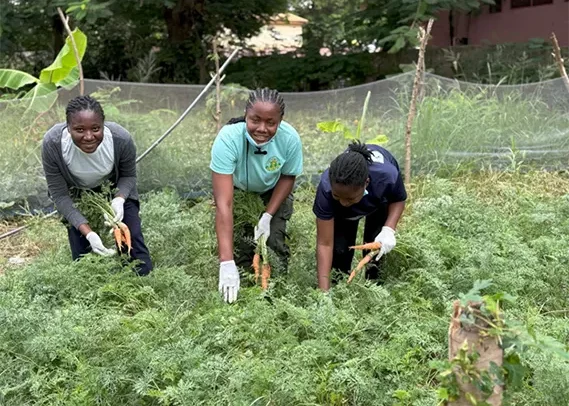Young women participating in vegetables cultivation
Access to land, skills, and supportive policies remains a major barrier for many young women aspiring to succeed in agriculture, according to the Kosmos Innovation Center (KIC).
The organisation noted that without these enablers, opportunities for inclusion in the agribusiness value chain are limited, leaving women underrepresented in shaping Ghana’s food systems.
The KIC explained that its Young Farmer Business Academy (YFBA) is changing this narrative by equipping young women with practical farming skills, mentorship, and resources.
According to the programme managers, YFBA is not only boosting participants’ confidence and capacity but also strengthening their voices in policy and advocacy spaces.
At the Kwadaso Agricultural College (KAC), young women in the programme are cultivating vegetables such as carrots while gaining hands-on experience in sustainable farming, KIC officials disclosed.
They added that the training goes beyond farming techniques to include extension services, land policies, and agricultural financing, which directly impact the viability of agribusiness ventures.
Through the YFBA, KIC ensures that the voices of these young women are not confined to the farm but amplified in decision-making spaces, the organisation stated.
Programme leaders explained that participants are encouraged to engage local leaders, policymakers, and stakeholders to advocate for inclusive agricultural policies that recognize the potential of women and youth.
“These inspiring participants of our Young Farmer Business Academy are proving that with access to land, skills, and supportive policies, young women can thrive in agribusiness and lead the change toward sustainable food systems,” said Terrence, Programme Manager at KIC.
Speaking on the broader impact of the program, Benjamin Gyan-Kesse, Executive Director of KIC, emphasised that “policy is as important as practice in agriculture. We cannot build sustainable food systems without ensuring that young people, especially women, have the enabling environment to thrive.”
“At KIC, we are committed to bridging this gap by preparing our entrepreneurs to not only farm but to advocate for policies that make farming viable,” he stated.
According to him, the YFBA is more than an agricultural training programme.
He said it is designed as a leadership pipeline for the next generation of agripreneurs who will advocate, innovate, and transform food systems in Ghana and beyond.
By Samuel Boadi


